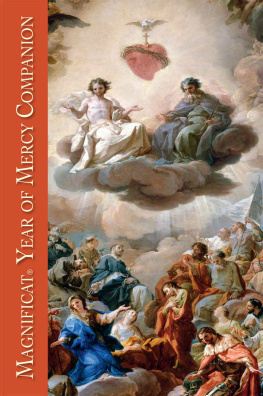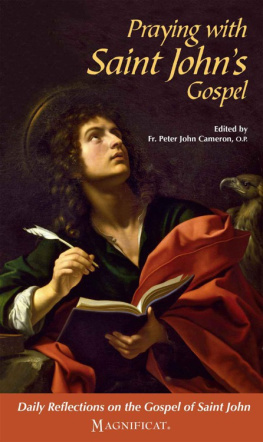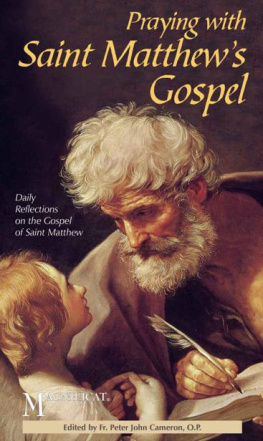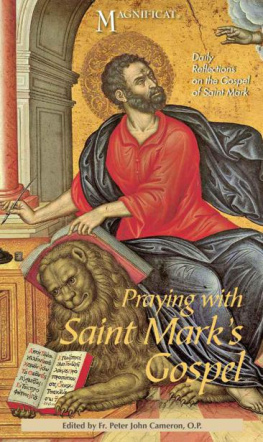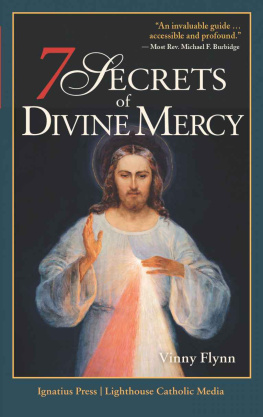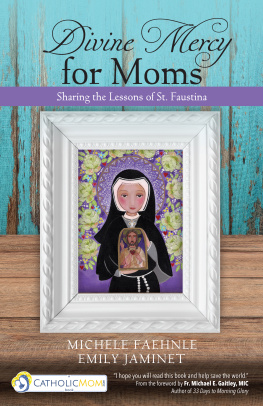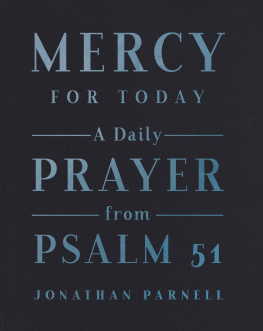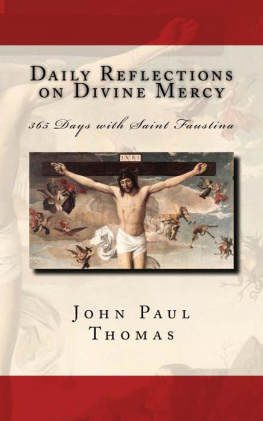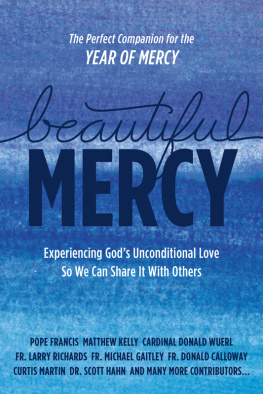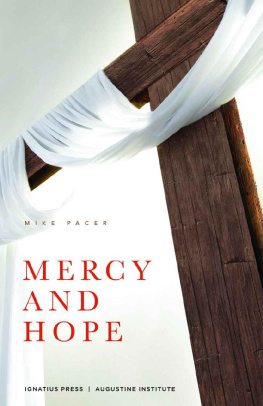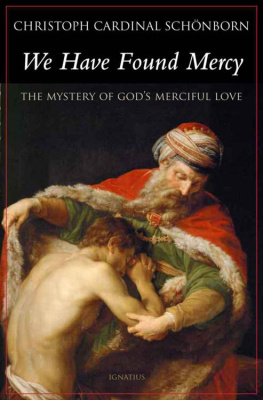Table of Contents
EDITORIAL
Father Peter John Cameron, O.P.
W ITH JOY WE ENTER INTO the Extraordinary Jubilee of Mercy, which Pope Francis calls a special time for the Church, a time when the 11itness of believers might grow stronger and more effective (Misericordiae Vultus 3).
The first sign of civilization
It is reported that a student once asked the famous anthropologist Margaret Mead, What is the earliest sign of civilization in any given culture? According to the story, the questioner likely expected Mead to say a tool, a weapon, a piece of pottery, an artifact of domestic life, etc.
Instead, the anthropologist answered: A healed femur (the big leg bone between the hip and the knee). A healed femur shows that someone took care of the injured person. Someone else had to step in to carry out the work of hunting and gathering until the individuals fractured leg healed. For Mead, the first sign of civilization was the evidence of compassion.
Pope Francis has called for the Extraordinary Jubilee of Mercy to make that primordial sign of civilization plain and far-reaching in the world again.
How to use this book
The pope has proclaimed a Jubilee of Mercy because, as he writes, at times we are called to gaze even more attentively on mercy so that we may become a more effective sign of the Fathers action in our lives (MV 3) To assist with that attentive gaze, Magnificat is pleased to offer this Year of Mercy Companion.
You will find within something for each day of the Jubilee Year, and much more as well. Sundays are set apart by the forty-nine original poems written for this book. On Mondays you will read an array of meditations on the theme of divine mercy. Tuesdays bring an encounter with the saints of mercy. Wednesdays offer thoughtful catechetical essays addressing the most salient points of the theology of mercy. Thursdays are dedicated to witnesses of mercy, whether they be found in history, the present day, or literature. Fridays reflect on the notion of mercy as it appears in Sacred Scripture. And Saturdays stand dedicated to prayerful devotions of many sorts.
Also, in the Red Line Section of the book you will discover reference materials for the Jubilee Year that you will want to return to again and again: essays on the meaning of a Jubilee Year, the conditions for gaining the Jubilee Year indulgence, the Jubilee Calendar of Events, a Little Office of Divine Mercy, a Year of Mercy Penance Service, and more.
Merciful like the Father
Pope Francis tells us that this special Holy Year is a time to bear the weaknesses and struggles of our brothers and sisters (MV 10), an occasion to open our eyes and see the misery of the world, the wounds of our brothers and sisters (MV 15).
We can do so when we recall how much God looked upon our own wounds and misery with untellable, unlimited love and mercy Let us pray for the grace to be effective signs of the Fathers mercy to others, with the assurance given by Doctor of the Church Saint Francis de Sales:
Do not look forward in fear to the changes in life;
rather, look to them with full hope that as they
arise,
God, whose very own you are, will lead you safely through all things; and when you cannot stand it, God will carry you in his arms.
Do not fear what may happen tomorrow; the same understanding Father who cares for you today will take care of you then and every day. He will either shield you from suffering or will give you unfailing strength to bear it. Be at peace,
and put aside all anxious thoughts
and imaginations.
Then, touched by [Gods] compassion, we also can become compassionate towards others (MV 14).

J ESUS CHRIST IS THE FACE of the Fathers mercy. These words might well sum up the mystery of the Christian faith. We need constantly to contemplate the mystery of mercy. It is a wellspring of joy, serenity, and peace. Our salvation depends on it. Mercy: the word reveals the very mystery of the Most Holy Trinity. Mercy: the ultimate and supreme act by which God comes to meet us. Mercy: the fundamental law that dwells in the heart of every person who looks sincerely into the eyes of his brothers and sisters on the path of life. Mercy: the bridge that connects God and man, opening our hearts to the hope of being loved forever despite our sinfulness.
At times we are called to gaze even more attentively on mercy so that we may become a more effective sign of the Fathers action in our lives. For this reason I have proclaimed an Extraordinary Jubilee of Mercy as a special time for the Church, a time when the witness of believers might grow stronger and more effective.
With our eyes fixed on Jesus and his merciful gaze, we experience the love of the Most Holy Trinity.
Misericordiae Vultus 1-3, 8
What Is Mercy?
M ERCY IS THE FORM LOVE TAKES when it encounters misery. It is first of all a form of love because it wants what is good for the one who is loved. Keeping this in mind can keep us from some subtle and corrupting mistakes. For example, Saint Thomas Aquinas points out that mercy is a Godlike virtue because it involves the strong showing pity to the weak, and from this truth someone may delight in showing mercy precisely because it allows him to highlight his own superiority on both a spiritual and a material level. But this isnt really mercy. Its just pride dressing up as mercy. Its the sort of pride that Saint Francis de Sales said would make the poor hate you for the very bread you give them.
Mercy is not condescension. Instead it is a kind of restoration. Imagine someone of royal lineage who has recently fallen upon hard times. He is wandering and lost and perhaps suffering from a form of amnesia. He cannot tell you his name. If you encounter this person, you feel compelled to restore something lost. You dont love the fact that he doesnt have access to who he really is. You love what he is and who he is, and so you strive to restore who he really is.
Or imagine a young person lacking judgment, experience, and knowledge. If you love this young person, you dont love her poverty in these matters. You love her and what she could be with the proper instruction and guidance, and therefore you want to free her from her present limitations. This is the gift of mercy, and it is rooted in profound respect.
This way of putting things makes a difference, because one could place the stress elsewhere. One could, for example, stress the fact that mercy is contrasted with justice. It is an undeserved gift, and hence to receive it marks one forever as one of the undeserving poor. To receive mercy would, in that case, also be to receive a form of contempt.
God knows us as he intends us to be; his sons, his daughters, his friends. He knows that he has fitted us for himself and that no other destiny for us will do. When he knows us as sinners and as unable to secure our own deliverance from our sins, he knows us as needing his mercy. But this mercy is, in a way, called for, not by reason of our own merits, but because of his own fatherly affection for us and because he sees the change in us that his fathers love will produce. His mercy reflects Gods true judgment on us as being not his undeserving poor but his own beloved children.
Father John Dominic Corbett, O.P.

